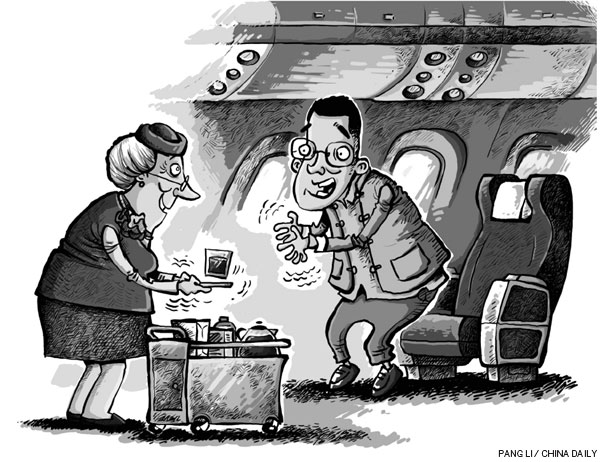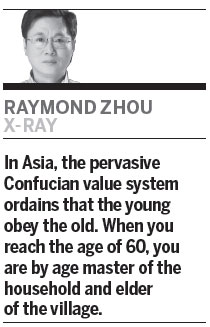The tangled web of cultural niceties
Updated: 2014-04-19 07:35
By Raymond Zhou (China Daily)
|
||||||||
Every culture has rules - some implicit - about the roles of gender and age. When they collide, predicaments arise.
A few years ago when I was traveling across the Pacific Ocean on a United Airlines flight, I was thrown into the perfect storm of cultural collisions. It was nothing melodramatic, but rather, quiet and imperturbable in a Chekhovian kind of way.
As the aircraft reached a certain height, flight attendants started to serve drinks and then the meal. The one who came my way was an elderly lady. I would say she was past the age of 65, but I could be wrong.

She had the feeble gait that I would associate with someone in retirement, to put it mildly. As soon as she started pouring a drink for me, I had to suppress my urge to jump up and say "Please, you sit down and I'll pour YOU a drink!"
Did I mention she was Asian? In China, children would definitely have addressed her as "granny". It took the Chinese many decades to adjust to the Western way of deliberately calling someone, especially a woman, by a younger term.
There were so many layers of cultural conflicts that I can only untangle them one at a time.
The first is ageism. I've often heard Chinese passengers complain about the age of flight attendants on non-Asian airlines. In China, they are invariably young and often good-looking. But most in such service on Western airlines are middle-aged these days. If a Chinese businessman has flown domestically for years and then, for the first time, gets on a US airline, he would be in for a big shock.
From a pragmatic point of view, I don't think the Chinese practice is sustainable. You can recruit youngsters when you first start, but you cannot fire all of them when they reach, say, 40. Some of them may be reshuffled to positions in administration, but surely not all of them. I'm still wondering where all those "stewardesses" go when they are no longer in the bloom of youth.

Now "stewardess" is considered politically incorrect and has been replaced. In Chinese, the equivalent kongjie (air sister or sister in the air) is actually more sexist. So, when Chinese gripe about their flying experiences on Western airlines, they often change the term to "air matron" and, in my case, probably "air granny".
Perhaps it's just me, but I feel a crucial distinction between being served by a 45-year-old and by a 65-year-old. In Asia, the pervasive Confucian value system ordains that the young obey the old. When you reach the age of 60, you are by age master of the household and elder of the village. You wait to be served by those younger than you.
After that UA episode, I did some soul-searching. I can debate with my compatriots about the rights of the 45-year-old in this line of job, so why not the 65-year-old if he or she can perform the task? If looks should not be a factor in such a judgment, then the age difference should not matter.
If you examine it from another perspective, the woman who served me could have had all kinds of practical reasons for continuing to work. Shouldn't she be applauded for being a contributing member of society?
Maybe it was the slight shaking of her hand that triggered my sentiments. But no, even if she had been steady, I still would have been uncomfortable. The notion that someone old enough to be a grandfather or grandmother walking down an aircraft aisle, which could be caught in sudden turbulence, and serving younger passengers would utterly overturn the Confucian respect for senior citizens.
Since UA is not a Chinese airline and most of its customers are non-Chinese, my culture-specific angst had to be kept to myself in case it created trouble for her. During the flight, I ordered as little as possible and cleaned up my table before she came. I wanted to minimize her workload the best way I could.
I knew it was ludicrous, but I couldn't help it. I was not brought up in a very traditional family, but still that situation unsettled me, to say the least.
The issue is often compounded with sexism. Were the UA flight attendant a man, would I have thought differently? Fundamentally, no. During my first trip overseas, back in 1986, I was placed in a similar but smaller dilemma. Our Canadian host took us, a group of Chinese, to a restaurant and the teenage girls in my group helped serve the food. The host asked me, the translator, whether China followed the "women first" etiquette. I said no, we have the "elders first" Confucian rule.
But I was only half right. Sure, the girls were about 16 or 17, and they were serving a man aged about 40. If we reversed the gender and put a 17-year-old male and a 40-year-old woman in the same situation, the youngster would be the one doing the ad hoc waiter's job.
But most crucial in this equation, as I recalled it, was the man's social position. He was the leader of our group, the highest-ranking official. So, it didn't matter whether it was a he or she. Other people would take care of his or her plate as a courtesy.
What if the person helping him with the food was his senior in age but not in position? That would be an interesting situation. If we transform the teenage girl into a 50-year-old woman, would it be culturally appropriate for him to sit there and be served? Maybe, I guess. But if she was over 60, I would say he would have squirmed in his seat.
Adults help children because the latter are small and weak. Youngsters yield to those senior in generation because the latter have earned it and the practice has evolved into a custom here in China and other Asian countries under strong Confucian influence. In China it is being subverted - in actuality if not in name - by the single children who act as "little emperors" and tend to lord it over their parents and grandparents.
I guess it's the same process for women's status in the West. They were traditionally considered weak and the object of protection and chivalry strengthened it into an expectation. Here in China, men do not hold doors for women and the level of equality on a Chinese bus or subway train is nothing short of staggering. What do Western feminists make of that? Is it progress as women are obviously no longer perceived as weaker than men, or is it a gross manifestation of rudeness toward the fair sex?
A recent report of a squabble on a bus may help illustrate the complexity of real life over ordained principles. A young woman had a seat and in came an elderly man who planted himself in front of her.
Good manners by Chinese custom dictate she offer her seat to him.
She did not budge. And she had a good reason, which others could not easily detect. She was two months pregnant. By Chinese etiquette, pregnant women enjoy the right to a seat just as the elderly or those carrying babies. The elderly gentleman, without that piece of information, demanded she give up the seat, and she, probably unwisely, did not reveal her pregnancy until a scuffle had broken out.
Who should have been given priority in this situation, the two-month pregnant woman or the frail gentleman? (I assume he was frail.) There is no rule about which of these two demographics should get more "respect".
The right thing, as I would have figured, was that she told the truth as soon as he asked for the seat and the person sitting next to her should have graciously offered his or her seat to the elderly man.
Culture, unlike science, should have rules but should accommodate exceptions as well.
Contact the writer at raymondzhou@chinadaily.com.cn.
(China Daily 04/19/2014 page15)

 'Taken 2' grabs movie box office crown
'Taken 2' grabs movie box office crown
 Rihanna's 'Diamonds' tops UK pop chart
Rihanna's 'Diamonds' tops UK pop chart
 Fans get look at vintage Rolling Stones
Fans get look at vintage Rolling Stones
 Celebrities attend Power of Women event
Celebrities attend Power of Women event
 Ang Lee breaks 'every rule' to make unlikely new Life of Pi film
Ang Lee breaks 'every rule' to make unlikely new Life of Pi film
 Rihanna almost thrown out of nightclub
Rihanna almost thrown out of nightclub
 'Dark Knight' wins weekend box office
'Dark Knight' wins weekend box office
 'Total Recall' stars gather in Beverly Hills
'Total Recall' stars gather in Beverly Hills
Most Viewed
Editor's Picks

|

|

|

|

|

|
Today's Top News
Weibo, Leju go public in New York
Silicon mayors on mission to China
Hainan Air announces 1st Beijing to Boston directs
Google glass making profits in China
J&J builds world's largest supply chain base
BlackRock licensed to invest further in China using yuan
UN hosts Chinese Language Day
US Commerce chief vows trade growth
US Weekly

|

|








